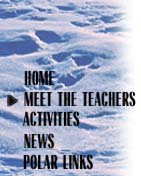
|
|
1 July, 2000
It's the Weekend
Our time at Summit is getting short. We will be leaving on July 11 to fly
back to Kanger then according to the flight schedule back to the US on July
13. Of course, this is only contingent upon the weather and no unforeseen
mechanical problems with the Herk. We are suppose to be flying back with
ice cores which means our flight back to the US will be quite cold-6 hours
in an ice box. Brrrrr. Nick and I agreed that we ought to bring our
sleeping bags to stay warm on this flight. Can you imagine fully dressed
in arctic gear and stepping out on a runway back in the States where it
will be 90 degrees. I can't wait.
There is a big push for science at Summit these last few days. We were
asked to stop all experiments on July 6th because we need to pack all the
gear to bring back to the US. Nick and I will go into calibration mode
which means we need to reorient our data towers putting all the instruments
on the same level to make sure that they are still measuring the same. We
then need to get the towers ready for the winter over. We will have to
disassemble one tower and pack away the instruments. This should take us
approximately 2-3 days. The other scientists have quite a lot of
instruments to pack so I'm sure we will be helping them pack their gear if
time permits. All the science gear must be put on pallets by Sunday so the
camp staff can secured this delicate equipment for shipping back to the
States. There is a lot to do and not much time left.
Besides my own research projects, I have been working with Dr. Hans-Werner
Jacobi from the University of Arizona (as mentioned previously). After our
small snowstorm yesterday, there was an accumulation of approximately 1cm
of new snow. Hans asked if I would take snow samples of this new snow for
a 36 hr period, every 4 hours. He is investigating how much H2O2 and HCOC
is present in the new snow and how the concentration changes over the 36 hr
period (Sat 8am to Sun 8pm). I agreed to help with this experiment. I was
excited to be able to follow through with a complete experiment myself.
First I dug a small snow pit (50 cm deep). I took samples of the fluffy
powder snow and funneled it into 2 jars. I began collecting snow at 8 am
Saturday. According to the planned schedule, I needed to take samples at
intervals: 8am, 12pm, 4pm, 8pm, 12am, 4am, 8am, 12pm, 4pm and 8pm.
Although this doesn't sound difficult but I was on a schedule, something
that I haven't had since I left teaching on June 5th. I felt like a real
scientist especially when I had to take samples at 12 am and then get up
and take samples again at 4 am. The 4 am reading was very cool. I was the
only one awake in camp. I had to hike about .5 k to the snow pit (on the
other side of camp in the clean zone). The sun was bright in the northern
sky and the day was crisp with a light wind. The only sound was the
generator, a soft hum breaking the silence. Of course, I went back to bed
and woke up to take the next reading and my weather observation at 8am .
Monday morning I will begin the H2O2 analysis of these snow samples.
Since it was the weekend, there is a much more leisurely pace. I was able
to complete my day with a great workout that included spinning on the bike
(45 mins), lifting and ballet (30 mins) all before dinner. The night was
beautiful so a nice ski was in order followed by a sauna. Who says that
field camp is hard?
Ciao, Cathi
Contact the TEA in the field at
.
If you cannot connect through your browser, copy the
TEA's e-mail address in the "To:" line of
your favorite e-mail package.
|
